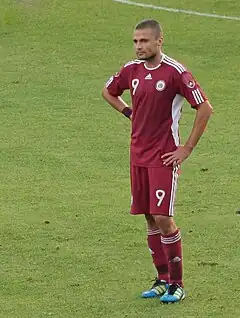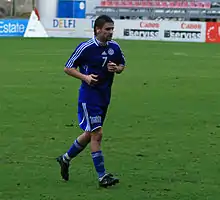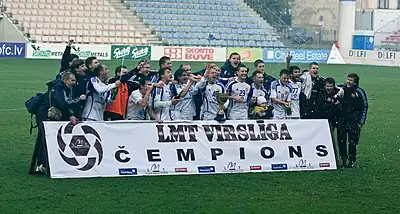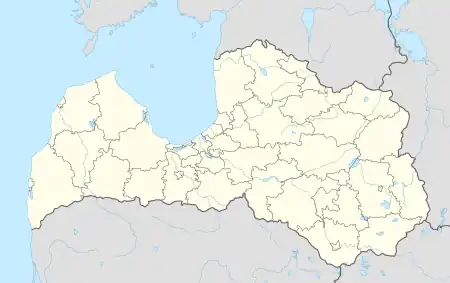 | |
| Founded | 1927 |
|---|---|
| Country | |
| Confederation | UEFA (Europe) |
| Number of teams | 10 |
| Level on pyramid | 1 |
| Relegation to | Optibet Nākotnes līga |
| Domestic cup(s) | Latvian Cup Latvian Supercup |
| International cup(s) | UEFA Champions League UEFA Europa League UEFA Europa Conference League |
| Current champions | RFS (2nd title) (2023) |
| Most championships | Skonto (15) |
| TV partners | International Eleven Sports OneFootball |
| Website | optibetvirsliga |
| Current: 2023 Latvian Higher League | |
Latvian Higher League or Virslīga, known for sponsorship reasons as Optibet Virslīga since 2019, is a professional football league and the top tier of association football in Latvia. Organised by the Latvian Football Federation, the Higher League is contested by 10 clubs.
History and league format
History
The first all-national Latvian championship, which succeeded the Riga Football League and other regional leagues, was organized in 1927, which lasted until the Soviet occupation of Latvia in 1940. After World War II, between 1945 and 1991 the championship of Soviet Latvia was the main footballing competition in the Latvian SSR.
With Latvia regaining full independence in August 1991, the newly established Latvian Football Federation (LFF) decided to reorganise its competitions within the Virslīga from 1992.[1] The same year Latvia returned to FIFA and became a member of UEFA.
Format
After the 2007 season the league increased from eight to ten sides.[2] In 2008 each side played the others four times. From 2015 till 2018 there were eight participating clubs. This was increased to nine for the 2019 season and ten for the 2020 season.[3]
At the end of the season, the lowest placed team are automatically relegated into 1. līga, and the winner of the 1. līga automatically takes their place. The second lowest placed team in Virslīga and the second team of 1. līga play two matches for a place in the Virslīga the following season. The winner of Virslīga, the champion of Latvia, plays in the UEFA Champions League qualifying round. The second and third placed clubs play in the UEFA Europa League qualifying games.[4]
A winter off-season league cup, the Virslīga Winter Cup, was played in January of each year from 2013 to 2017, which was replaced in 2018 by the Virslīga Cup (Latvian: Virslīgas kausa izcīņa).[5]
There again will be 10 teams in 2022 season. Last year participants RFS, Valmiera FC, FK Liepāja, Riga FC, FK Spartaks Jūrmala, BFC Daugavpils and FK Metta will be joined by newcomers FK Auda, FK Tukums 2000/Telms and SK Super Nova.[6]
Sponsorships and name changes

The League has changed sponsors for several times. From 2005 until 2010 it was known as the LMT Virslīga. No sponsorships were established for the 2011 season. Starting from the 2012 season, the league was reorganised in partnership with an NGO as "Latvijas Futbola virslīga",[7] adopting the NGO's name in the 2012 season. From 2013 to 2015, the league was known as the SMScredit.lv Virslīga due to a contract with the online microfinance company SMScredit.[8] In March 2016, it was announced that the Virslīga would be sponsored by SynotTip Sports Bar on a three-year contract.[9] They were succeeded by betting firm Optibet on a two-year contract, beginning with the 2019 season.[10]
Clubs (2023)
| Club | Position in 2022 |
|---|---|
| Valmiera | 1st |
| Riga FC | 2nd |
| RFS | 3rd |
| Liepaja | 4th |
| FK Auda | 5th |
| Tukums | 6th |
| BFC Daugavpils | 7th |
| FK Metta | 9th |
| SK Super Nova | 10th |
| FK Jelgava | 1st in First League (2022) |
Titles by year
Source:[11]
Riga Football League
Latvian Championship 1922–1940 (independent)
|
|
Football Championship of Latvian SSR 1942–1990
|
|
Since independence in 1991
|
|
Topscorers (1991-present)
- 1991 Vjaceslavs Zevnerovics (Celtnieks) 27
- 1992 Vjaceslavs Zevnerovics (VEF Riga) 19
- 1993 Alexander Yeliseyev (Skonto Riga) 20
- 1994 Vladimir Babichev (Skonto Riga) 14
- 1995 Vitalijs Astafjevs (Skonto Riga) 19
- 1996 Mihails Miholaps (Daugava Riga) 33
- 1997 David Chaladze (Skonto Riga) 25
- 1998 Viktors Dobrecovs (Metalurgs) 23
- 1999 Viktors Dobrecovs (Metalurgs) 22
- 2000 Vladimirs Kolesnicenko (Skonto Riga) 17
- 2001 Mihails Miholaps (Skonto Riga) 24
- 2002 Mihails Miholaps (Skonto Riga) 23
- 2003 Viktors Dobrecovs (Metalurgs) 36
- 2004 Alexander Katasonov (Metalurgs) 21
- 2005 Viktors Dobrecovs (Metalurgs) 18
Igors Slesarcuks (Venta/Ventspils) 18 - 2006 Mihails Miholaps (Skonto Riga) 15
- 2007 Vits Rimkus (Ventspils) 20
- 2008 Vits Rimkus (Ventspils) 14
- 2009 Kristaps Grebis (Metalurgs) 30
- 2010 Deniss Rakels (Metalurgs) 18
Nathan Júnior (Skonto Riga) 18 - 2011 Nathan Júnior (Skonto Riga) 22
- 2012 Mamuka Ghonghadze (Daugava Daugavpils) 18
- 2013 Arturs Karasausks (Skonto Riga) 16
Andrejs Kovalovs (Daugava Daugavpils) 16 - 2014 Vladislavs Gutkovskis (Skonto Riga) 25
- 2015 Davis Ikaunieks (Liepaja) 15
- 2016 Girts Karlsons (Ventspils) 17
- 2017 Yevgeni Kozlov (Spartaks Jurmala) 10
Arturs Karasausks (Liepaja) 10
Adeleke Akinjemi (Ventspils) 10 - 2018 Darko Lemajic (FC Riga) 15
- 2019 Darko Lemajic (FC Riga/Rigas FS) 15
- 2020 Luiz Paulo Hilario Dodo (Liepaja) 18
- 2021 Leonel Wamba (Spartaks Jurmala) 14
- 2022 Raimonds Krollis (Valmiera) 12
- 2023 Marko Regza (FC Riga) 19
Notable managers and players
 Aleksandrs Starkovs has won 12 league titles since independence with Skonto as a manager.
Aleksandrs Starkovs has won 12 league titles since independence with Skonto as a manager. Three times winner with Ventspils Ukrainian Roman Hryhorchuk is the first manager who reached Europa League group stage in Virslīga history.
Three times winner with Ventspils Ukrainian Roman Hryhorchuk is the first manager who reached Europa League group stage in Virslīga history. First-ever Latvian who scored in Euros Māris Verpakovskis has won league titles with both Skonto and Liepāja.
First-ever Latvian who scored in Euros Māris Verpakovskis has won league titles with both Skonto and Liepāja. Ukrainian born Marians Pahars has won 5 league titles before moving to Southampton.
Ukrainian born Marians Pahars has won 5 league titles before moving to Southampton.
 Aleksandrs Koliņko, best known for playing for Crystal Palace has won 6 league titles totally with Skonto as a player and Spartaks as an assistant manager.
Aleksandrs Koliņko, best known for playing for Crystal Palace has won 6 league titles totally with Skonto as a player and Spartaks as an assistant manager.
Most titles
This is a list of clubs, in order of most titles won in championships in independent Latvia (1922–1940 and 1991 to date).[11] Teams in bold are part of 2020 Virslīga.

By club
| Club | No. of Titles | Years won |
|---|---|---|
| 15 | 1991, 1992, 1993, 1994, 1995, 1996, 1997, 1998, 1999, 2000, 2001, 2002, 2003, 2004, 2010 | |
| 8 | 1924, 1925, 1926, 1930, 1931, 1934, 1935, 1940 | |
| Olimpija Liepāja | 7 | 1927, 1928, 1929, 1933, 1936, 1938, 1939 |
| Ventspils | 6 | 2006, 2007, 2008, 2011, 2013, 2014 |
| ASK Riga | 3 | 1932, 1942, 1944 |
| Riga FC | 3 | 2018, 2019, 2020 |
| Liepājas Metalurgs | 2 | 2005, 2009 |
| Kaiserwald Riga | 2 | 1922, 1923 |
| JPFS/Spartaks Jūrmala | 2 | 2016, 2017 |
| RFS | 2 | 2021, 2023 |
| Valmiera | 1 | 2022 |
| FK Liepāja | 1 | 2015 |
| Daugava Daugavpils | 1 | 2012 |
Rivalries
The most well-known rivalry is the Kurzeme Derby (Kurzemes derbijs) between Ventspils and Liepāja.[12] The two biggest clubs in Kurzeme have played 86 matches between themselves with a record of 31–28–27 (including Metalurgs) in favor of Liepāja prior to the 2019 Virslīga.[13]
Since 2016, the Riga Derby (Rīgas derbijs) was started between Riga FC and Rīgas FS as two clubs were promoted at the same time. A 2019 match in Skonto Stadium between the two sides broke a ten-year attendance record.[14]
Virslīga clubs in international competitions
Ventspils was the Latvian first club who qualified for the group stage of a UEFA club competition, reaching the 2009–10 UEFA Europa League group stage.[15]
Skonto reached the UEFA Champions League last qualifying stage for a number of times in the late 1990s and early 2000s, but lost to such teams like Barcelona in 1997, Inter Milan in 1998 and Chelsea in 1999.
Most recently, RFS qualified for the 2022-23 UEFA Europa Conference League group stage, finishing in fourth place with 2 points.
References
- ↑ "Latvia". UEFA. All rights reserved. 3 September 2018. Archived from the original on 26 September 2019. Retrieved 23 August 2019.
- ↑ Mike Dryomin (14 March 2008). "Latvia 2007". RSSSF. Archived from the original on 28 September 2022. Retrieved 23 July 2012.
- ↑ "Sacensību sistēmas modeļa apstiprināšana". lff.lv (in Latvian). Archived from the original on 1 April 2019. Retrieved 23 August 2019.
- ↑ Hartmanis, Martins (1 December 2007). "LMT Virslīga new season calendar published". Latvian Football Federation. Archived from the original on 3 March 2016. Retrieved 20 February 2008.
- ↑ "Ziemas kauss futbolā vairs nenotiks, to aizstās Virslīgas kausa izcīņa". LA.lv (in Latvian). 22 December 2017. Archived from the original on 28 June 2018. Retrieved 7 August 2019.
- ↑ "LFF piešķir virslīgas licences 10 klubiem". Archived from the original on 28 January 2022. Retrieved 28 January 2022.
- ↑ "About Virslīga". Biedrība Latvijas Futbola Virslīga. Futbolavirsliga.lv. Archived from the original on 28 June 2013. Retrieved 16 June 2013.
{{cite web}}: CS1 maint: bot: original URL status unknown (link) (in Latvian) - ↑ "Latvijas futbola virslīgai nākamajā sezonā būs jauns ģenerālsponsors". Public Broadcasting of Latvia (in Latvian). 17 October 2018. Archived from the original on 7 August 2019. Retrieved 7 August 2019.
- ↑ "Virslīga ar "SynotTip" noslēdz vērienīgāko līgumu līgas vēsturē" (in Latvian). Sportacentrs.com. 10 March 2016. Archived from the original on 29 July 2020. Retrieved 13 March 2016.
- ↑ "Becomes main sponsor of Latvian football league". Enlabs AB. Archived from the original on 20 September 2023. Retrieved 18 March 2019.
- 1 2 Almantas Lauzadis and Hans Schöggl (23 March 2017). "Latvia – List of Champions". RSSSF. Archived from the original on 12 August 2022. Retrieved 9 June 2017.
- ↑ Kurzeme derby
- ↑ "Futbola virslīgā tiks aizvadīts Kurzemes derbijs". TVNET (in Latvian). 20 June 2019. Archived from the original on 23 August 2019. Retrieved 23 August 2019.
- ↑ Suveizda, Agris (2 June 2019). "Rīgas derbijs labo Virslīgas desmitgades apmeklētības rekordu". SportaCentrs.com (in Latvian). Archived from the original on 7 September 2019. Retrieved 23 August 2019.
- ↑ Europa League group stage
External links
- https://www.futbolavirsliga.tv Association Virsliga in Latvia
- Current Virsliga table at eurorivals
- Virsliga fixtures, including kick off times, at worldfootball.net
- Topscorers at RSSSF
